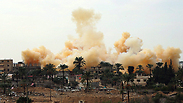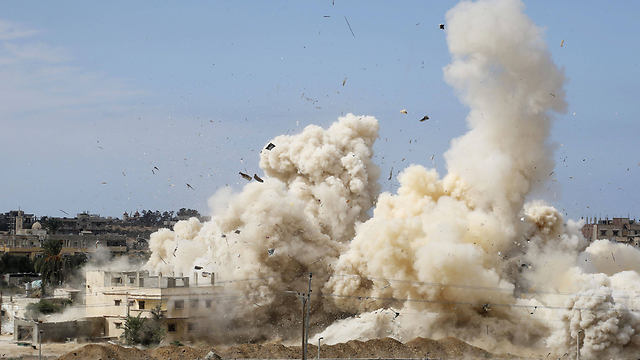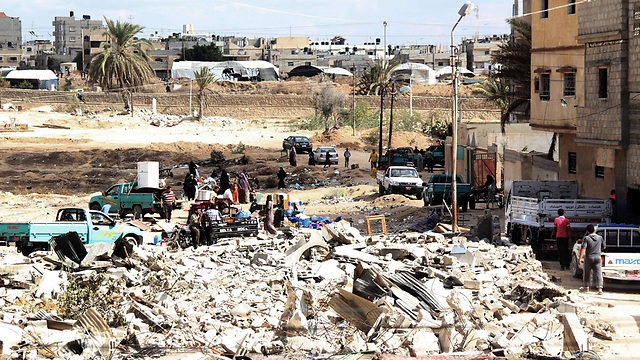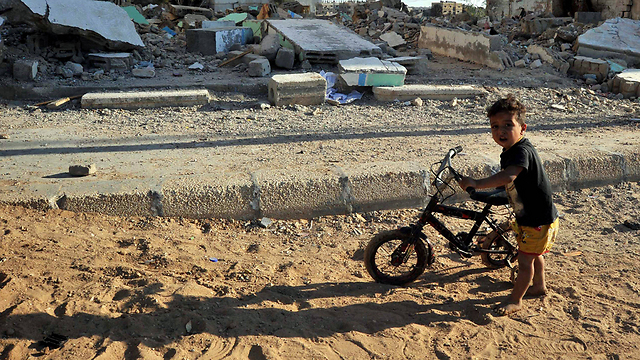
Smoke billows over Rafah
Photo: EPA.
Egyptian troops are pressing ahead with the demolition of hundreds of homes along the border with the Gaza Strip, cutting off electricity and firing warning shots in the air in a heavy-handed campaign to evict thousands of
residents from the volatile area.
The forced evacuations in Egypt's Sinai Peninsula are further alienating a restive population with longstanding grievances against the government of Egyptian President Abdel-Fattah el-Sissi, raising the risk of more violence in the lawless region.
The demolitions, meant to halt the smuggling of weapons and militants in and out of Gaza, have also put pressure on Hamas, the militant group that controls Gaza and has long counted on smuggling tunnels as its lifeline.
Egypt announced the demolition plan last month after militants killed 31 Egyptian troops in an assault on a checkpoint 20 miles (30 kilometers) from Rafah. Egypt has long accused Islamic militants of using smuggling tunnels to move in and out of Gaza and announced it would clear out a 500-yard-wide (meter) buffer zone along the border.
In recent days, Egyptian forces have steadily cleared out residents and dynamited several homes each day. The goal is to raze 800 homes and force out 10,000 residents.
Security officials say the operation is going smoothly and should be completed within two or three weeks.
Residents say there is little they can do.
"We have no options but silence and lining up behind the military. This is not the time to clash with the state because any clash with the state will be perceived as a betrayal to Egypt," said Said Aitaq. He lives about one-and-a-half miles beyond the buffer zone, but says residents fear the area will be expanded to up to three miles.
Rafah was split into two halves -- one Palestinian and one Egyptian -- after Egypt signed its peace agreement with Israel in 1978. While Egypt has sealed off its side of the city and barred journalists from entering, scenes of the operation are visible from the Gaza side of the border.
The Egyptian side of the city is under curfew from dawn to dusk, and electricity and water are cut off during the day as homes are being demolished, residents reached by phone told The Associated Press.
Egyptian troops order people to leave with just a day's notice, they said.
"The situation is hellish. We don't know where we will go. We put our things at the place of a friend until we know where we are going," said one resident, who gave only his first name, Abu Mohammed, for fear he would be punished by the security forces or risk losing compensation.
"You can't protest. They are strong and well-armed," he said of the troops, who residents said are accompanied by dogs and occasionally fire into the air.
Egypt has offered compensation of roughly $20,000 to $30,000 per home -- a sum that residents say does not come close to replacing their losses. They say the compensation process is bureaucratic and there is little time to find new housing.
One man, who requested anonymity because of safety fears, said his 70-member extended family moved from a four-story building into a single-floor space of just 1,300 square feet after they were told their home would be destroyed.
"We are big families, extended families. We can't just scatter and go away. We have been living here for decades," he said.
On Tuesday, an excavator could be seen flattening a home, followed by a loud explosion that rocked the area and elicited panicked screams from schoolchildren on the Palestinian side of the city. The students covered their faces with jackets to keep from inhaling the yellowish smoke.
As the air cleared, two flattened concrete homes could be seen.
"The kids are always tense. In the day, there are the blasts. In the night, we hear heavy shooting," said Majdi Yousef, a 38-year-old carpenter who lives in an apartment building on the Gaza side that overlooks the border.
Residents say the forces dynamite several apartment buildings a day, and bulldozers flatten another 20 homes. They say few people have received payouts yet.
Egypt's Foreign Ministry said families would receive a down payment to cover three months of rent and full compensation once their property is appraised. The ministry said 30 families had received compensation as of Sunday.
The state will pay up to $140 million in compensation, el-Sissi said earlier this week. He praised the people of Sinai and accused unnamed factions of "trying to sow discord between the people of Sinai and the Egyptian state."
North Sinai is one of Egypt's poorest districts, and the local population has complained of neglect and discrimination for decades.
Aitaq said the forced evictions could lead some people to join militant groups.
"I am afraid that these groups will only find more supporters because of this plan," he said.
Over the past decade, the northern region of the Sinai Peninsula has become a hub for Islamic extremists, and the insurgency has spiked since last year's military ouster of Islamist President Mohammed Morsi.
No one has claimed responsibility for the deadly Oct. 24 attack. But el-Sissi has made no secret about his disdain for Hamas -- the ideological ally of Morsi.
Since taking power last year, el-Sissi's government has destroyed most of Hamas' smuggling tunnels. The new buffer zone appears to be aimed at stamping out the last remnants. The Egyptian Foreign Ministry said security forces have found dozens of tunnels under evacuated houses.
The crackdown has been accompanied by Egypt's closure of the Rafah border crossing -- the main gateway for Gazans to the outside world.
Hamas spokesman Salah Bardawil said the demolitions on the Egyptian side change little since the tunnels have already been closed for more than a year. "We say it's Egyptian land and it's the Egyptians' right to do this," he said.
Other Hamas officials said they believe Egypt is trying to crush the group, but refused to go on the record with those comments, for fear that criticism of the el-Sissi government would invite further sanctions.


















